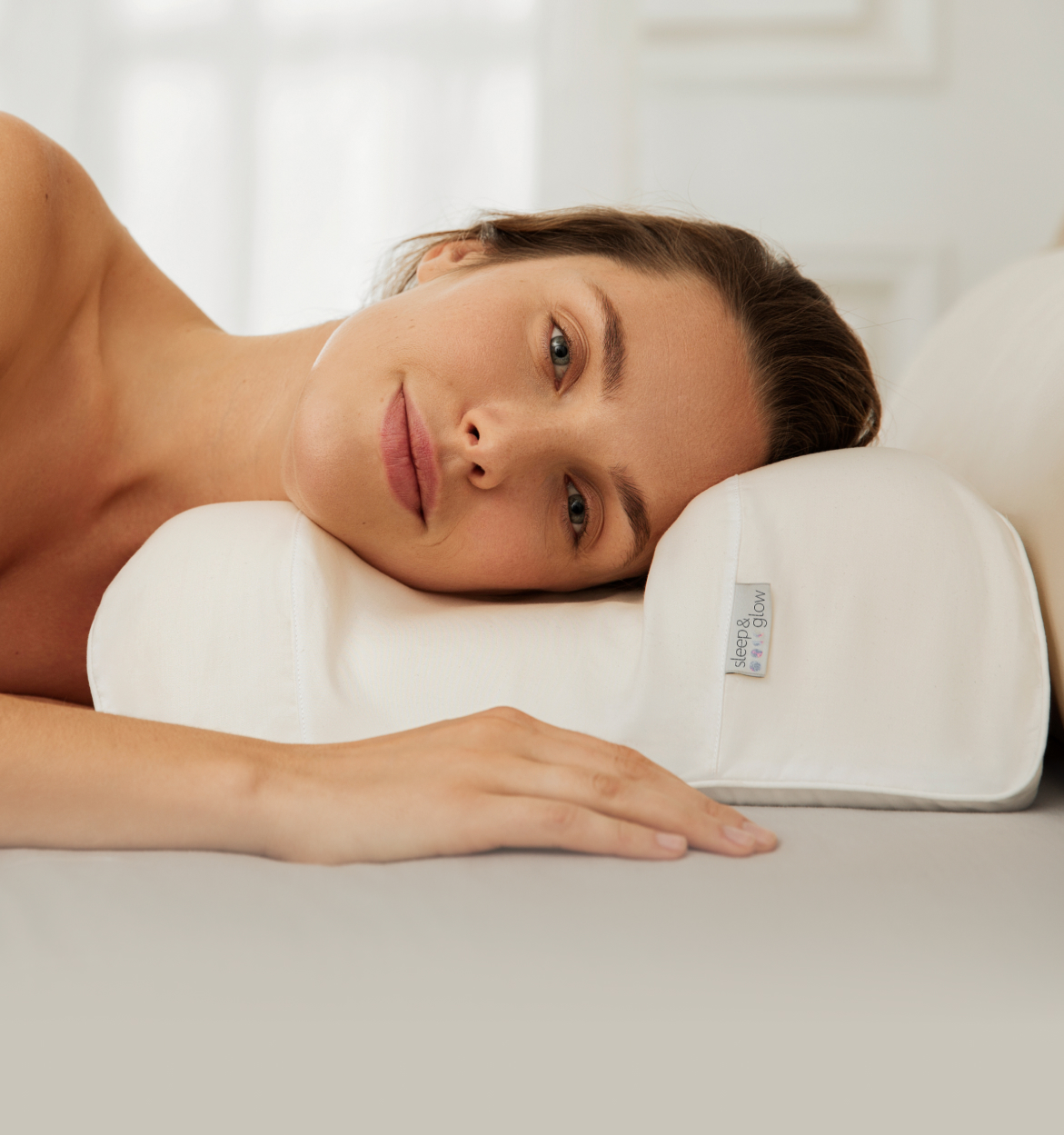garoupilled_
Message me if you need help regarding your looks
- Joined
- Sep 5, 2022
- Posts
- 1,911
- Reputation
- 4,252
What if I told you...
that scientists have discovered a brand new revolutionary pill,
that when taken daily...
increases your lifespan by 10 years, makes your face more attractive, increases IQ, lowers depression and anxiety, enhances memory by 20%, increases testosterone production by 15%, protects you from cancer, heart attack, and even stroke, but most importantly...
Can make you happier than getting a $60,000 raise...
Would you take it?
If so, worry no longer buddy boyo, since all secrets regarding this magic pill will be revealed in this megaguide.
Table of contents
1) Quick introduction to the topic
2) A shortened but comprehensive understanding of how and why our body's natural biological clock functions
3) The correct sleeping position
4) Napping
5) Melatonin intake and its controversy
6) Sleep apnea
7) Beliefs
8) Environment
9) Intake
10) Habits
11) Supplements
12) What the perfect circadian flow schedule looks like and best times to do stuff in the day
-----------------------------------------------------------------------------------------------------------------------------------------------------------------------------------
1) Introduction
● Water is wet. We all know sleep is crucial for mental and physical well-being and the roles its plays in our body. With that said, why would I even need to further convince you about getting a deep night's rest, right?
● Even so, the thing that most people don't get a realistic grasp on is to which degree poor sleep quality can affect your face and be a huge looksmin, especially in the long run.
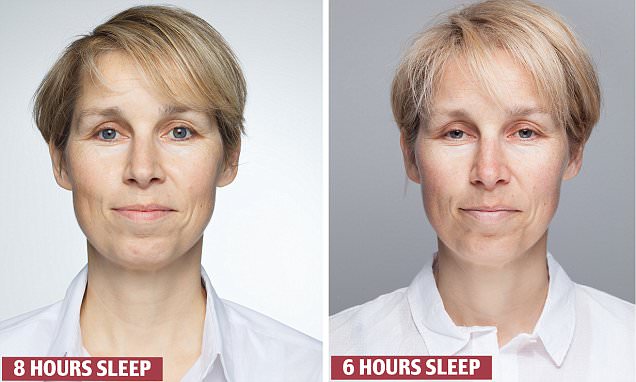

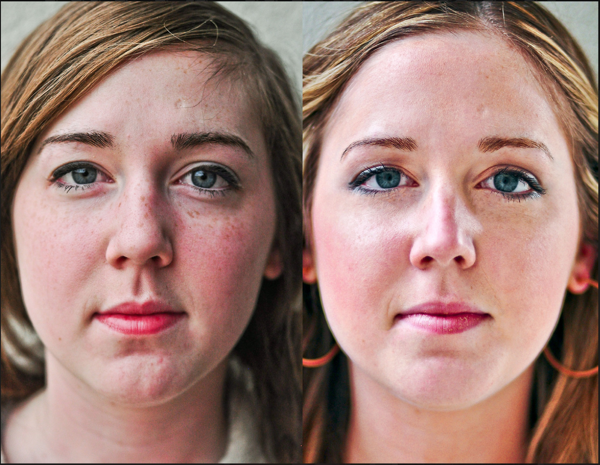


● Swollen and bloated face; poor orbital support and skin firmness on the eyelids, acne, dark circles, redder eyes, droopy resting face, marks of aging and expression significantly worse with only a days difference.
● Not only that, but lack of sleep also makes you non-sociable and an outcast, even as much as individuals with actual diagnosed social anxiety, diminishing your chances of people interacting with you. Who would want to befriend someone whos always in a grumpy mood anyways, right?
Sleeping poorly can even actually reduce your testicular size.
● At this point, I'm sure you're well aware of the downsides and health-related issues that not getting enough rest implicates in - with that in mind, let's make this quick and dive into how to get the best sleep possible, by improving what we spend 1/3 of our entire lives doing, ironically, without giving it the proper attention it deserves.
-----------------------------------------------------------------------------------------------------------------------------------------------------------------------------------
2) Understanding your body's natural biological clock


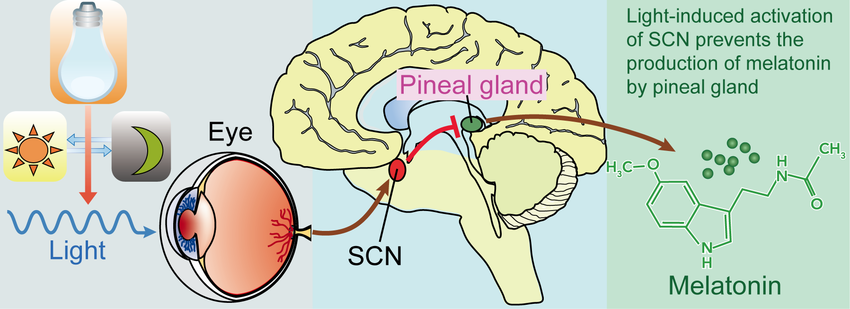
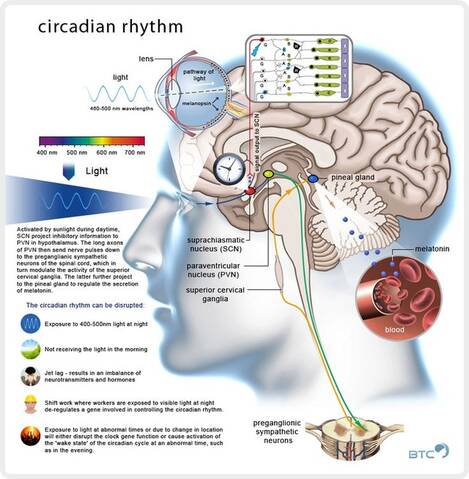
● The circadian clock is a 24-hour internal body timing system that regulates your sleep-wake cycle and is synchronized by the day-night cycle as well. Keep a note on this since it will be useful later. It determines all your biological processes such as body temperature, hormone release timing, metabolism, and more. It functions based on two main frameworks; the circadian process, which is regulated by the suprachiasmatic nucleus located in the hypothalamus, the master clock of the body. It receives light information (primary external cue) from the retina by specialized photoreceptor cells that detect light level alterations and adjusts internal homeostasis accordingly, such as melatonin, produced by the pineal gland in response to darkness and promotes sleep, and cortisol, made in the adrenal glands promoting alertness at its peak 30 minutes after waking up. The second framework is the homeostatic process, which is a buildup of adenosine in the brain as a byproduct of cellular metabolism which increases with time spent awake. The longer we stay awake, the more adenosine is bound to A1 and A2 receptors, inhibiting the activity of wake-promoting neurons and their releases of acetylcholine, histamine, and norepinephrine, which prompts sleep-promoting neurons in the hypothalamus, making us drowsy.
-----------------------------------------------------------------------------------------------------------------------------------------------------------------------------------
3) The correct sleeping position
● Overall, the best sleeping position to be in is by your side, more specifically on the left side. This is due to a series of advantages this position renders to the body during nighttime, such as improved glymphatic system cleansing (brain metabolical waste by neuron activity byproduct removal), enhanced stomachal and pancreatic function, better lymphatic drainage, slower resting heart rate and blood flow, and most importantly, reduced gravity of sleep apnea and airway obstruction.
● The only two main downsides of sleeping by your side are hip and spine misalignment, which can be solved by positioning a small pillow (or your own arm) supporting your neck and a body pillow between your legs to create hip balance. Other than that, the friction and pressure of your face onto the pillow may cause wrinkles and age your skin a bit faster than usual in the long run. Albeit there isn't really an effective way to counter this of which I personally know rather than getting a pillow with a soft surface.
● Interestingly enough, we can also confirm this is the most natural and correct sleep position by observing other primates



-----------------------------------------------------------------------------------------------------------------------------------------------------------------------------------
4) Napping
● By taking a closer look at the circadian rhythm and even at our own lunch habits, we can observe a natural dip in energy levels during the afternoon, specifically between 1 and 3 PM. During this time, short naps (20 to 35 minutes) could be optimal for alertness and cognitive performance without tapping into deeper slumber and disrupting your nighttime schedule, due to the adjustment of energy fluctuation accordingly to ultradian rhythms. Albeit, napping is best if taken as a habit and done consistently throughout every day at approximately the same hours, adjusting it to your circadian pattern. Even so, if you don't usually feel tired or have your energy levels drop in the afternoon, it is not necessary at all.
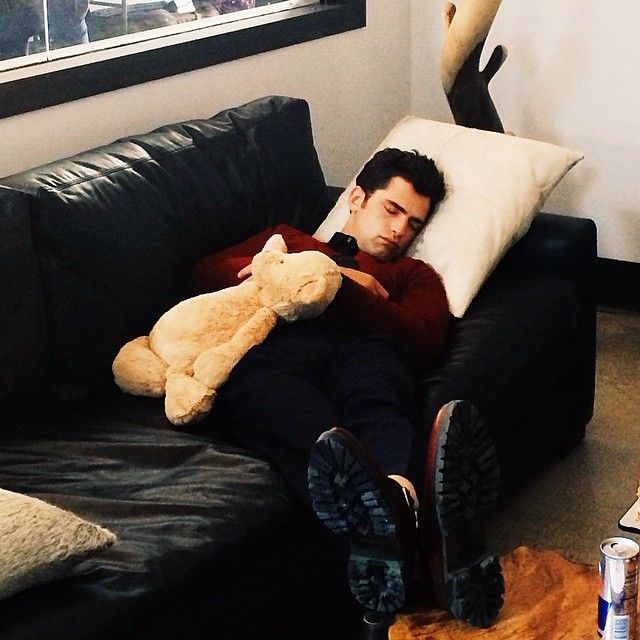

-----------------------------------------------------------------------------------------------------------------------------------------------------------------------------------
5) Melatonin supplementation
● Our pineal gland naturally produces from 0,1 to around 0,5mg of melatonin throughout the day, but melatonin supplements can be found to contain even over 10mg per dose. Making an analogy with testosterone, pretty sure you wouldn't want to inject a 100x supraphysiological amount into yourself on a frequent basis.
● Another common misconception in the popular belief is that melatonin supplementation should be treated as a sedative. Melatonin intake should be used as little as possible for the sole sake of regulating your natural production through circadian rhythm balance rather than taking it in huge doses in hopes of falling asleep faster. Ideally, you'd only use it when fucking up your natural clock for it to reset faster to its usual setting, regulating your melatonin release. Supplementing for the wrong sake will also make you groggy by when you wake up in the morning since your body isn't used to such an override in your system, taking more time to clear up all the excess melatonin and delaying your habitual cortisol spike.
-----------------------------------------------------------------------------------------------------------------------------------------------------------------------------------
6) Sleep apnea
● Sleep apnea can either be obstructive, where throat muscles relax and block airway flow (most common case) or central, where the brain fails to properly access breathing control through electrical impulses. If you usually wake up with brain fog or feeling groggy very often, even If you've slept for an adequate amount of hours (7-10), you might want to get it checked. If you lay on your back and feel your airways being blocked by relaxing your muscles you probably have it as well.
● It's extremely important to make clear that if you have a severe case of sleep apnea you should access it urgently before thinking about any other other way to improve your sleep such as the methods listed below in the thread. Sleep apnea can be caused by nasal congestion or inflammation, recessed jaw, low hyoid bone positioning and high fat concentration in the submental area, hypothyroidism, acid reflux, weak muscles, and a deviated septum. You can cure it through surgery, better health habits, or a CPAP machine, and you can cope by sleeping on your side and doing neck and facial exercises that strengthen the throat muscles, such as these.
-----------------------------------------------------------------------------------------------------------------------------------------------------------------------------------
7) Beliefs
● Mindset plays a big role in everything life-related, sleep included. If you didn't get your magical 8 hours of sleep of the day, don't obsess about it and think that your productivity is going to be terrible or that your day is ruined. Apply the 80/20 rule to your sleep protocol and focus on getting better rest the next day rather than feeling pessimistic in the present moment.
As we've already covered, your body slowly shutdowns throughout the afternoon and evening. For this reason, preparing yourself hours ahead and facilitating that process can help tremendously for better sleep. A few of these could be:
● Take a warm shower 1 to 2 hours before going to bed. This imitates the temperature drop your body naturally flows in the evening and also relaxes your muscles, making you fall asleep more easily. When you take a warm shower, your peripheral blood vessels dilate, resulting in a rise of skin temperature. After getting out, the temperature shock by exposure to the external air causes a drop in body temperature levels, imitating your circadian rhythm.
● Work as hard as possible throughout the day. As you have already probably noticed, whenever we have a big day and get lots of things done we naturally feel more sleepy by the end of it. On the other hand, the more "nothing" you do, the less sleepy you'll feel. By requiring a bigger amount of effort from your own body for daily activities, cellular byproduct production will increase, which results in more adenosine linking to your brain. If you're not falling asleep quickly, maybe putting more into your workflow could enhance that feeling by the end of the day. Try to get as much done in the morning, and unwind during the afternoon.
● It's also important to notice that your body doesn't differentiate between weekdays and weekends. Maintaining a schedule that fits into your routine 24/7 is crucial for sleep health and circadian stability. If you're going out, drinking, and sleeping late, try to wake up max 2 hours after your usual in order to mitigate fluctuation downsides.
But let's suppose this isn't feasible. Then begs the question, should I oversleep, or wake up in my usual setting sleep deprived? The answer is up to you. If you oversleep, you'll feel more replenished and productive that day, but your circadian rhythm will have shifted. In case you wake up at the same time, but with fewer sleep hours, said shift will be less severe, but your energy won't be at the max. Apply accordingly.
-----------------------------------------------------------------------------------------------------------------------------------------------------------------------------------
8) Environment
● Make your room cold: the perfect temperature setting for the night is between 62 and 66 Fahrenheit, or 16 to 19 Celsius.
● Get rid of all the lights in your room besides overhead and lamps: any light during nighttime is a distraction, will elevate your cortisol, block your melatonin production and dysregulate your cycle. Avoid artificial lights as soon as possible before getting into bed.
● Get blackout curtains and possibly an eye mask: your room should be able to get pitch black during noon. If you still have any light entrance, use an eye mask (a non-irritating one).
● Get a weighted blanket close to 10% of your total body weight for better sleep. Source here.
● Invest in a high-quality mattress: there's no point in spending 1/3 of your life on a cheap mattress. There are several high-tech mattresses out in the market which regulate their own temperature accordingly to yours and can greatly improve your rest with other features included. If you have the money, it's worth looking into.
● Orthopedic pillow: as we've covered before, sleeping on your side is the best position possible. Although this is true, it may cause shoulder, neck, and spine issues (as with every other sleeping position), which can be reduced by resting on an ergonomic surface.
● White noise: if you're a slight sleeper, adding white noise to the background can help. This creates a stable and consistent noise level throughout your sleep which can avoid baseline differentiation sounds to wake you up, mask other annoying sounds in your surrounding, and create a soothing effect by association with the noise, prompting your brain to fall asleep faster.
● Avoid EMFs in your sleeping room: it is well known that Electromagnetic Fields are harmful to our health in general, but they can also worsen your sleep by blocking melatonin secretion, interfering with brain activity during sleep, and increasing oxidative stress at a cellular level. To avoid this, get rid of all electronic devices in your room and place them as far as possible throughout your house. At nighttime, turn them off. There are also products in the market that serve as EMF shields.
● Blue light screen filters and glasses: most screens nowadays are embedded with the option to reduce blue light emission and brightness closer to the evening. On top of that, special glasses with light filters are also an option. The only problem is that by using these, your focus is still on the screen, so you will inherently maintain the will to be awake since you're focused on a specific activity.
Keep in mind that these filters are not 100% effective. Blue light blocks roughly 80% of melatonin production, red light blocks 40%, and fire or candle light blocks around 2%.
If you've ever gone out to buy some glasses, many times you are advertised to install blue light blocking lenses packed together with your prescription ones. While these indeed partially block blue light, it doesn't even come close to being effective, rather just another scam to grab your money. Blocking lenses can be clear (blocks 20-40%), yellow (blocks 40 to 70%), and red (block 90 to 99%). The ones you get offered to install are always the clear ones because no one wants to be walking outdoors with these on:

-----------------------------------------------------------------------------------------------------------------------------------------------------------------------------------
9) Intakes
● Ingesting salt tabs with (ideally) gatorade before bed can help with nocturnal urination. The salt and the electrolytes will "bloat" you slightly and retain the water overnight, so you don't feel the urge to wake up mid-sleep to go to the bathroom.
● Melatonin is originally produced from serotonin. When your pineal gland signals to release melatonin, serotonin is converted to NAS through the AANAT enzyme. Afterward, NAS is converted to melatonin through the HIOMT enzyme. With this in mind, it's important to produce enough serotonin capable of sustaining a good mood throughout the day, and ensure proper melatonin production. As we've already covered, supplementing melatonin directly is a terrible idea, so to increase your serotonin naturally, you can:
Maintain healthy habits in general (water stuff like less anxiety and stress, meditation, having an active social life, etc).
5-HTP: 50 to 200mg daily.
Omega 3: 2g of EPA and DHA.
Probiotics: at least 1 billion CFU (the more the better). Lactobacillus and Bifidobacterium are best for mood and serotonin support.
B6: 100mg.
Vit D: best to get from sun exposure after waking up, but if not, anywhere between 1k and 10k IU daily.
Magnesium: 400mg daily.
SAMe: 1g daily.
Tryptophan: 500mg per day.
Rhodiola Rosea: 200mg daily.
Ginkgo Biloba: 150mg daily.
B9: 400mcg per day.
Inositol: 500mg per day.
Zinc: 30mg per day.
Foods that boost serotonin (tryptophan-rich): eggs, cheese, pineapples, tofu, salmon, nuts and seeds, turkey, chicken, milk, seafood in general, dairy, lentils, beans, chickpeas, red meat, bananas, quinoa, buckwheat, oats, spinach, broccoli, asparagus, dark chocolate.
● Always eat at the same time of the day: by eating in the same time window frequently, you adjust your circadian rhythm to digestion and bowel movements accordingly. This will help reduce drowsiness and energy spikes and downs by the afternoon, and maintain glucose homeostasis.
● Nasal strips work by physically widening the nasal passages and improving airflow. They can be used in order to help with sleep apnea, snoring, congestion and exercise, but are also a great sleep quality improver in general since your oxygenation levels will improve, making you wake up feeling better.
● Don't use stimulants after 10 AM: The half-life of caffeine is about 7 hours. Let's say you use 500mg as pre workout at 10 AM - at midnight, your blood will still have 125mg. Only use stimulants earlier in the day and at low doses, as little frequently as possible. If necessary, cycle them (4 days on, 3 days off).
● Have your last meal and drink 3 to 2 hours before bed - by eating and drinking right before bedtime, you increase metabolism and body temperature when it's supposed to shut down. To prevent this, concentrate your water intake and meals earlier in the day until the afternoon, to give yourself proper rest. This also reduces your chances of waking up in the middle of the night, leading to less sleep fragmentation.
-----------------------------------------------------------------------------------------------------------------------------------------------------------------------------------
10) Habits
● Getting sunlight in the early morning: prompts your suprachiasmatic nucleus to set your internal clock - this will make you more energetic in the morning hours and facilitate sleep during nighttime. On the same note, getting light in the morning is as important as avoiding it during the night; make sure your eyes receive natural sunlight or at least blue light from the time you wake up until roughly 3 PM.
● Meditation or breathing exercises before going to bed: lowers cortisol and puts the brain in a zen state by reducing norepinephrine and body temp.
● Workout earlier in the day: after a workout, our body temperature maintains itself high for a couple of hours in order to respond to the physical demand the muscles just went through. Although physical exercise might make you sleepy, exercising not too close to bedtime is best.
● Make an alarm for when to sleep and not when to wake up: this is huge. It's crucial to notice that your body shouldn't have a correct time of waking up (it should naturally wake up at the same hours in response to your epigenetic input, and rest as much as necessary), but instead, the correct timing of always sleeping on the same schedule. This makes a life-changing impact when done right.
● Orgasms prompt the release of oxytocin, known as the love hormone, and prolactin. Both of these cause a feeling of well-being and relaxation, which can aid sleep. It also reduces body temp and releases endorphins and serotonin, all of which contribute to better rest.
-----------------------------------------------------------------------------------------------------------------------------------------------------------------------------------
11) Supplements
● Magnesium Glycinate: makes your dreams wild and vivid; increases your sleep time and sleep quality. Probably the most impactful supplement from this stack. Take 400mg before bed.
● Glycine: promotes body coolness, helps neurotransmitters protein synthesis and supports stable energy levels throughout the day. Take 1g during nighttime.
● Ashwagandha: reduces stress and anxiety, and promotes GABA production (anti-neuronal excitability). Take 500mg in the evening or before bed.
● L-Theanine: similar function to ashwagandha. Take 100mg before bed.
● 5-HTP: an amino acid the body produces from tryptophan. A precursor to serotonin, which converts to melatonin. Take 200mg on an empty stomach.
-----------------------------------------------------------------------------------------------------------------------------------------------------------------------------------
CONTINUES IN COMMENTS EXCEEDED 100K WORD LIMIT
that scientists have discovered a brand new revolutionary pill,
that when taken daily...
increases your lifespan by 10 years, makes your face more attractive, increases IQ, lowers depression and anxiety, enhances memory by 20%, increases testosterone production by 15%, protects you from cancer, heart attack, and even stroke, but most importantly...
Can make you happier than getting a $60,000 raise...
Would you take it?
If so, worry no longer buddy boyo, since all secrets regarding this magic pill will be revealed in this megaguide.
Table of contents
1) Quick introduction to the topic
2) A shortened but comprehensive understanding of how and why our body's natural biological clock functions
3) The correct sleeping position
4) Napping
5) Melatonin intake and its controversy
6) Sleep apnea
7) Beliefs
8) Environment
9) Intake
10) Habits
11) Supplements
12) What the perfect circadian flow schedule looks like and best times to do stuff in the day
-----------------------------------------------------------------------------------------------------------------------------------------------------------------------------------
1) Introduction
● Water is wet. We all know sleep is crucial for mental and physical well-being and the roles its plays in our body. With that said, why would I even need to further convince you about getting a deep night's rest, right?
● Even so, the thing that most people don't get a realistic grasp on is to which degree poor sleep quality can affect your face and be a huge looksmin, especially in the long run.




● Swollen and bloated face; poor orbital support and skin firmness on the eyelids, acne, dark circles, redder eyes, droopy resting face, marks of aging and expression significantly worse with only a days difference.
● Not only that, but lack of sleep also makes you non-sociable and an outcast, even as much as individuals with actual diagnosed social anxiety, diminishing your chances of people interacting with you. Who would want to befriend someone whos always in a grumpy mood anyways, right?
Sleeping poorly can even actually reduce your testicular size.
● At this point, I'm sure you're well aware of the downsides and health-related issues that not getting enough rest implicates in - with that in mind, let's make this quick and dive into how to get the best sleep possible, by improving what we spend 1/3 of our entire lives doing, ironically, without giving it the proper attention it deserves.
-----------------------------------------------------------------------------------------------------------------------------------------------------------------------------------
2) Understanding your body's natural biological clock




● The circadian clock is a 24-hour internal body timing system that regulates your sleep-wake cycle and is synchronized by the day-night cycle as well. Keep a note on this since it will be useful later. It determines all your biological processes such as body temperature, hormone release timing, metabolism, and more. It functions based on two main frameworks; the circadian process, which is regulated by the suprachiasmatic nucleus located in the hypothalamus, the master clock of the body. It receives light information (primary external cue) from the retina by specialized photoreceptor cells that detect light level alterations and adjusts internal homeostasis accordingly, such as melatonin, produced by the pineal gland in response to darkness and promotes sleep, and cortisol, made in the adrenal glands promoting alertness at its peak 30 minutes after waking up. The second framework is the homeostatic process, which is a buildup of adenosine in the brain as a byproduct of cellular metabolism which increases with time spent awake. The longer we stay awake, the more adenosine is bound to A1 and A2 receptors, inhibiting the activity of wake-promoting neurons and their releases of acetylcholine, histamine, and norepinephrine, which prompts sleep-promoting neurons in the hypothalamus, making us drowsy.
-----------------------------------------------------------------------------------------------------------------------------------------------------------------------------------
3) The correct sleeping position
● Overall, the best sleeping position to be in is by your side, more specifically on the left side. This is due to a series of advantages this position renders to the body during nighttime, such as improved glymphatic system cleansing (brain metabolical waste by neuron activity byproduct removal), enhanced stomachal and pancreatic function, better lymphatic drainage, slower resting heart rate and blood flow, and most importantly, reduced gravity of sleep apnea and airway obstruction.
● The only two main downsides of sleeping by your side are hip and spine misalignment, which can be solved by positioning a small pillow (or your own arm) supporting your neck and a body pillow between your legs to create hip balance. Other than that, the friction and pressure of your face onto the pillow may cause wrinkles and age your skin a bit faster than usual in the long run. Albeit there isn't really an effective way to counter this of which I personally know rather than getting a pillow with a soft surface.
● Interestingly enough, we can also confirm this is the most natural and correct sleep position by observing other primates



-----------------------------------------------------------------------------------------------------------------------------------------------------------------------------------
4) Napping
● By taking a closer look at the circadian rhythm and even at our own lunch habits, we can observe a natural dip in energy levels during the afternoon, specifically between 1 and 3 PM. During this time, short naps (20 to 35 minutes) could be optimal for alertness and cognitive performance without tapping into deeper slumber and disrupting your nighttime schedule, due to the adjustment of energy fluctuation accordingly to ultradian rhythms. Albeit, napping is best if taken as a habit and done consistently throughout every day at approximately the same hours, adjusting it to your circadian pattern. Even so, if you don't usually feel tired or have your energy levels drop in the afternoon, it is not necessary at all.


-----------------------------------------------------------------------------------------------------------------------------------------------------------------------------------
5) Melatonin supplementation
● Our pineal gland naturally produces from 0,1 to around 0,5mg of melatonin throughout the day, but melatonin supplements can be found to contain even over 10mg per dose. Making an analogy with testosterone, pretty sure you wouldn't want to inject a 100x supraphysiological amount into yourself on a frequent basis.
● Another common misconception in the popular belief is that melatonin supplementation should be treated as a sedative. Melatonin intake should be used as little as possible for the sole sake of regulating your natural production through circadian rhythm balance rather than taking it in huge doses in hopes of falling asleep faster. Ideally, you'd only use it when fucking up your natural clock for it to reset faster to its usual setting, regulating your melatonin release. Supplementing for the wrong sake will also make you groggy by when you wake up in the morning since your body isn't used to such an override in your system, taking more time to clear up all the excess melatonin and delaying your habitual cortisol spike.
-----------------------------------------------------------------------------------------------------------------------------------------------------------------------------------
6) Sleep apnea
● Sleep apnea can either be obstructive, where throat muscles relax and block airway flow (most common case) or central, where the brain fails to properly access breathing control through electrical impulses. If you usually wake up with brain fog or feeling groggy very often, even If you've slept for an adequate amount of hours (7-10), you might want to get it checked. If you lay on your back and feel your airways being blocked by relaxing your muscles you probably have it as well.
● It's extremely important to make clear that if you have a severe case of sleep apnea you should access it urgently before thinking about any other other way to improve your sleep such as the methods listed below in the thread. Sleep apnea can be caused by nasal congestion or inflammation, recessed jaw, low hyoid bone positioning and high fat concentration in the submental area, hypothyroidism, acid reflux, weak muscles, and a deviated septum. You can cure it through surgery, better health habits, or a CPAP machine, and you can cope by sleeping on your side and doing neck and facial exercises that strengthen the throat muscles, such as these.
-----------------------------------------------------------------------------------------------------------------------------------------------------------------------------------
7) Beliefs
● Mindset plays a big role in everything life-related, sleep included. If you didn't get your magical 8 hours of sleep of the day, don't obsess about it and think that your productivity is going to be terrible or that your day is ruined. Apply the 80/20 rule to your sleep protocol and focus on getting better rest the next day rather than feeling pessimistic in the present moment.
As we've already covered, your body slowly shutdowns throughout the afternoon and evening. For this reason, preparing yourself hours ahead and facilitating that process can help tremendously for better sleep. A few of these could be:
● Take a warm shower 1 to 2 hours before going to bed. This imitates the temperature drop your body naturally flows in the evening and also relaxes your muscles, making you fall asleep more easily. When you take a warm shower, your peripheral blood vessels dilate, resulting in a rise of skin temperature. After getting out, the temperature shock by exposure to the external air causes a drop in body temperature levels, imitating your circadian rhythm.
● Work as hard as possible throughout the day. As you have already probably noticed, whenever we have a big day and get lots of things done we naturally feel more sleepy by the end of it. On the other hand, the more "nothing" you do, the less sleepy you'll feel. By requiring a bigger amount of effort from your own body for daily activities, cellular byproduct production will increase, which results in more adenosine linking to your brain. If you're not falling asleep quickly, maybe putting more into your workflow could enhance that feeling by the end of the day. Try to get as much done in the morning, and unwind during the afternoon.
● It's also important to notice that your body doesn't differentiate between weekdays and weekends. Maintaining a schedule that fits into your routine 24/7 is crucial for sleep health and circadian stability. If you're going out, drinking, and sleeping late, try to wake up max 2 hours after your usual in order to mitigate fluctuation downsides.
But let's suppose this isn't feasible. Then begs the question, should I oversleep, or wake up in my usual setting sleep deprived? The answer is up to you. If you oversleep, you'll feel more replenished and productive that day, but your circadian rhythm will have shifted. In case you wake up at the same time, but with fewer sleep hours, said shift will be less severe, but your energy won't be at the max. Apply accordingly.
-----------------------------------------------------------------------------------------------------------------------------------------------------------------------------------
8) Environment
● Make your room cold: the perfect temperature setting for the night is between 62 and 66 Fahrenheit, or 16 to 19 Celsius.
● Get rid of all the lights in your room besides overhead and lamps: any light during nighttime is a distraction, will elevate your cortisol, block your melatonin production and dysregulate your cycle. Avoid artificial lights as soon as possible before getting into bed.
● Get blackout curtains and possibly an eye mask: your room should be able to get pitch black during noon. If you still have any light entrance, use an eye mask (a non-irritating one).
● Get a weighted blanket close to 10% of your total body weight for better sleep. Source here.
● Invest in a high-quality mattress: there's no point in spending 1/3 of your life on a cheap mattress. There are several high-tech mattresses out in the market which regulate their own temperature accordingly to yours and can greatly improve your rest with other features included. If you have the money, it's worth looking into.
● Orthopedic pillow: as we've covered before, sleeping on your side is the best position possible. Although this is true, it may cause shoulder, neck, and spine issues (as with every other sleeping position), which can be reduced by resting on an ergonomic surface.
● White noise: if you're a slight sleeper, adding white noise to the background can help. This creates a stable and consistent noise level throughout your sleep which can avoid baseline differentiation sounds to wake you up, mask other annoying sounds in your surrounding, and create a soothing effect by association with the noise, prompting your brain to fall asleep faster.
● Avoid EMFs in your sleeping room: it is well known that Electromagnetic Fields are harmful to our health in general, but they can also worsen your sleep by blocking melatonin secretion, interfering with brain activity during sleep, and increasing oxidative stress at a cellular level. To avoid this, get rid of all electronic devices in your room and place them as far as possible throughout your house. At nighttime, turn them off. There are also products in the market that serve as EMF shields.
● Blue light screen filters and glasses: most screens nowadays are embedded with the option to reduce blue light emission and brightness closer to the evening. On top of that, special glasses with light filters are also an option. The only problem is that by using these, your focus is still on the screen, so you will inherently maintain the will to be awake since you're focused on a specific activity.
Keep in mind that these filters are not 100% effective. Blue light blocks roughly 80% of melatonin production, red light blocks 40%, and fire or candle light blocks around 2%.
If you've ever gone out to buy some glasses, many times you are advertised to install blue light blocking lenses packed together with your prescription ones. While these indeed partially block blue light, it doesn't even come close to being effective, rather just another scam to grab your money. Blocking lenses can be clear (blocks 20-40%), yellow (blocks 40 to 70%), and red (block 90 to 99%). The ones you get offered to install are always the clear ones because no one wants to be walking outdoors with these on:

-----------------------------------------------------------------------------------------------------------------------------------------------------------------------------------
9) Intakes
● Ingesting salt tabs with (ideally) gatorade before bed can help with nocturnal urination. The salt and the electrolytes will "bloat" you slightly and retain the water overnight, so you don't feel the urge to wake up mid-sleep to go to the bathroom.
● Melatonin is originally produced from serotonin. When your pineal gland signals to release melatonin, serotonin is converted to NAS through the AANAT enzyme. Afterward, NAS is converted to melatonin through the HIOMT enzyme. With this in mind, it's important to produce enough serotonin capable of sustaining a good mood throughout the day, and ensure proper melatonin production. As we've already covered, supplementing melatonin directly is a terrible idea, so to increase your serotonin naturally, you can:
Maintain healthy habits in general (water stuff like less anxiety and stress, meditation, having an active social life, etc).
5-HTP: 50 to 200mg daily.
Omega 3: 2g of EPA and DHA.
Probiotics: at least 1 billion CFU (the more the better). Lactobacillus and Bifidobacterium are best for mood and serotonin support.
B6: 100mg.
Vit D: best to get from sun exposure after waking up, but if not, anywhere between 1k and 10k IU daily.
Magnesium: 400mg daily.
SAMe: 1g daily.
Tryptophan: 500mg per day.
Rhodiola Rosea: 200mg daily.
Ginkgo Biloba: 150mg daily.
B9: 400mcg per day.
Inositol: 500mg per day.
Zinc: 30mg per day.
Foods that boost serotonin (tryptophan-rich): eggs, cheese, pineapples, tofu, salmon, nuts and seeds, turkey, chicken, milk, seafood in general, dairy, lentils, beans, chickpeas, red meat, bananas, quinoa, buckwheat, oats, spinach, broccoli, asparagus, dark chocolate.
● Always eat at the same time of the day: by eating in the same time window frequently, you adjust your circadian rhythm to digestion and bowel movements accordingly. This will help reduce drowsiness and energy spikes and downs by the afternoon, and maintain glucose homeostasis.
● Nasal strips work by physically widening the nasal passages and improving airflow. They can be used in order to help with sleep apnea, snoring, congestion and exercise, but are also a great sleep quality improver in general since your oxygenation levels will improve, making you wake up feeling better.
● Don't use stimulants after 10 AM: The half-life of caffeine is about 7 hours. Let's say you use 500mg as pre workout at 10 AM - at midnight, your blood will still have 125mg. Only use stimulants earlier in the day and at low doses, as little frequently as possible. If necessary, cycle them (4 days on, 3 days off).
● Have your last meal and drink 3 to 2 hours before bed - by eating and drinking right before bedtime, you increase metabolism and body temperature when it's supposed to shut down. To prevent this, concentrate your water intake and meals earlier in the day until the afternoon, to give yourself proper rest. This also reduces your chances of waking up in the middle of the night, leading to less sleep fragmentation.
-----------------------------------------------------------------------------------------------------------------------------------------------------------------------------------
10) Habits
● Getting sunlight in the early morning: prompts your suprachiasmatic nucleus to set your internal clock - this will make you more energetic in the morning hours and facilitate sleep during nighttime. On the same note, getting light in the morning is as important as avoiding it during the night; make sure your eyes receive natural sunlight or at least blue light from the time you wake up until roughly 3 PM.
● Meditation or breathing exercises before going to bed: lowers cortisol and puts the brain in a zen state by reducing norepinephrine and body temp.
● Workout earlier in the day: after a workout, our body temperature maintains itself high for a couple of hours in order to respond to the physical demand the muscles just went through. Although physical exercise might make you sleepy, exercising not too close to bedtime is best.
● Make an alarm for when to sleep and not when to wake up: this is huge. It's crucial to notice that your body shouldn't have a correct time of waking up (it should naturally wake up at the same hours in response to your epigenetic input, and rest as much as necessary), but instead, the correct timing of always sleeping on the same schedule. This makes a life-changing impact when done right.
● Orgasms prompt the release of oxytocin, known as the love hormone, and prolactin. Both of these cause a feeling of well-being and relaxation, which can aid sleep. It also reduces body temp and releases endorphins and serotonin, all of which contribute to better rest.
-----------------------------------------------------------------------------------------------------------------------------------------------------------------------------------
11) Supplements
● Magnesium Glycinate: makes your dreams wild and vivid; increases your sleep time and sleep quality. Probably the most impactful supplement from this stack. Take 400mg before bed.
● Glycine: promotes body coolness, helps neurotransmitters protein synthesis and supports stable energy levels throughout the day. Take 1g during nighttime.
● Ashwagandha: reduces stress and anxiety, and promotes GABA production (anti-neuronal excitability). Take 500mg in the evening or before bed.
● L-Theanine: similar function to ashwagandha. Take 100mg before bed.
● 5-HTP: an amino acid the body produces from tryptophan. A precursor to serotonin, which converts to melatonin. Take 200mg on an empty stomach.
-----------------------------------------------------------------------------------------------------------------------------------------------------------------------------------
CONTINUES IN COMMENTS EXCEEDED 100K WORD LIMIT







